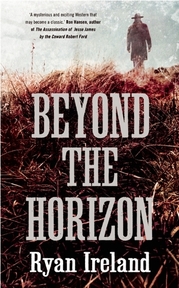| After a boyhood at sea amongst drunks and cannibals, the man sets off across the empty plains of North America, navigating by the stars. When his wagon bursts its axle, he decides the place he’s got to is as good as anywhere to settle and, when a passing band of Mexicans sell him a pregnant woman in exchange for coffee, his simple life seems complete. But then the stranger arrives out of nowhere and, despite warnings from the woman in a language the man can’t understand, sends him on a fool’s errand to register his makeshift family at the mythical Fort James. |
Most men alive right now will never see a gun. Someday people will think differently. They’ll tell stories of the old west and gunslingers, showdowns and shootouts … Children will have guns for play, our heroes will carry guns. And us – the history of the future – we will be assigned our stories based on the present.
The Indian boy who becomes the Chief holds a similar position (p178):
Death only contributed to this world, creating yet another pocket in the earth of broken down carbons and fossilised remains. To die is to become part of the world indefinitely. Fools will talk of achieving immortality through their works – they tell stories and create as if they were God – but in the end it all turns to dust. The places where your wondrous creations entertained others’ imaginations become hollow spaces, cavities, for the world to fester.
History is cyclical, and people merely compost for generations to come! And, like the characters in the moments before they are to die at the stranger’s hands, we accept this (p133):
Nothing is sacred in this world. The taste of flesh and the feeling of a full belly is enough to blind any man to the horrors we create. Time, it is known, can heal all things, the layers of dirt and lies building up one on top of another like scar tissue.
Life is without meaning and the purposes and activities we create for ourselves are nothing but distractions from this painful truth (p265-6):
Most people dont want to hear that their lives for the most part are empty. They identify themselves by trade, the families they rarely see, but are constantly constructing, reconstructing in their minds … These great empty spaces … give the illusion of movement, of progress. Didnt we all come west because it was empty?
The delights of this novel lie in the originality of the premise and the eloquence of the prose. But for me, the omission of apostrophes, whether historically authentic or not (the words dont and didnt in the above quote aren’t like that as a result of a typing error – indeed, the AutoCorrect was intent on changing them back to something more conventional), was an affectation too far. I was also surprised at the quantity of direct speech not translated from the various European languages, the majority in Spanish that I could more or less understand. Nevertheless, it’s laudable that Ryan Ireland has ventured beyond the usual horizons of the novel form, and that Oneworld (who provided my review copy) have chosen to publish the result.






















 RSS Feed
RSS Feed





















